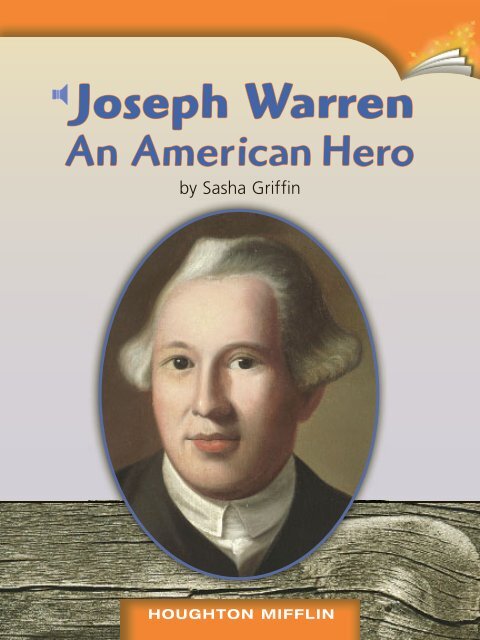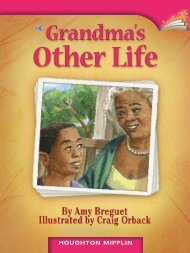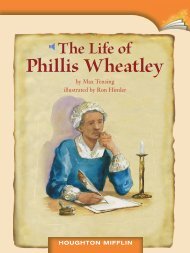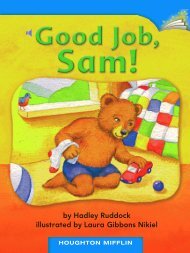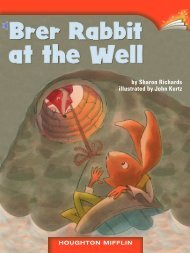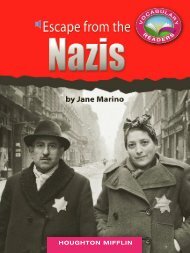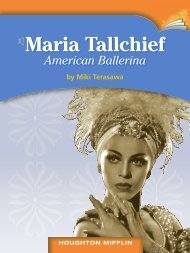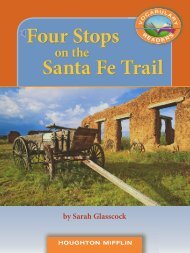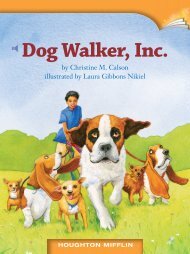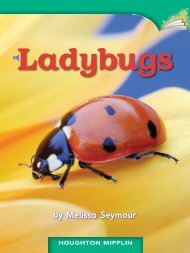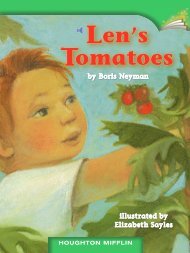You also want an ePaper? Increase the reach of your titles
YUMPU automatically turns print PDFs into web optimized ePapers that Google loves.
<strong>Joseph</strong> <strong>Warren</strong><strong>An</strong> <strong>American</strong> <strong>Hero</strong>by Sasha GriffinHOUGHTON MIFFLIN
<strong>Joseph</strong> <strong>Warren</strong><strong>An</strong> <strong>American</strong> <strong>Hero</strong>by Sasha GriffinPHOTOGRAPHY CREDITS: Cover (c) © Massachusetts Historical Society, Boston, MA, USA/The Bridgeman Art Library,(b) Siede Preis. Title page © The Granger Collection, New York. 2 (t) © Massachusetts Historical Society, Boston, MA,USA/The Bridgeman Art Library, (b) Siede Preis. 3 © The Granger Collection, New York. 5 © The Granger Collection, NewYork. 6 © Bettmann/CORBIS. 7 © North Wind Picture Archives. 9 © Getty Images. 10 © The Granger Collection, NewYork. 12 © The Art Archive/Culver Pictures/Picture Desk. <strong>13</strong> PhotoDisc/Getty Images. 14 © The Granger Collection, NewYork. 15 Painting by Don Troiani www.historicalimagebank.com. 16 The Battle of Lexington, 19th April 1775, 1910 (oil oncanvas), Wollen, William Barnes (1857-1936) / Courtesy of the Council, National Army Museum, London, UK/The BridgemanArt Library. 17 PhotoDisc/Getty Images.Copyright © by Houghton Mifflin Company. All rights reserved.No part of this work may be reproduced or transmitted in any form or by any means, electronic or mechanical, includingphotocopying or recording, or by any information storage or retrieval system without the prior written permission of thecopyright owner unless such copying is expressly permitted by federal copyright law. With the exception of nonprofittranscription into Braille, Houghton Mifflin is not authorized to grant permission for further uses of this work. Permissionmust be obtained from the individual copyright owner as identified herein. Address requests for permission to make copiesof Houghton Mifflin material to School Permissions, Houghton Mifflin Company, 222 Berkeley Street, Boston, MA 02116.Printed in ChinaISBN-<strong>13</strong>: 978-0-547-02293-2ISBN-10: 0-547-02293-X1 2 3 4 5 6 7 8 9 RRD 15 14 <strong>13</strong> 12 11 10 09 08
<strong>An</strong> <strong>American</strong> <strong>Hero</strong>The <strong>American</strong> Revolutionwas not only about battles andwar. <strong>An</strong>d it was not just thestory of heroes like GeorgeWashington and Paul Revere.There are stories behindthose battles. <strong>An</strong>d there areheroes who are not as wellknown.<strong>Joseph</strong> <strong>Warren</strong> is oneof those heroes. He did fightin some battles. But his workoff the battlefield was evenmore important. <strong>Warren</strong> wasa respected doctor. Hebecame a political writer and<strong>Joseph</strong> <strong>Warren</strong>speaker. He worked tirelessly as a Patriot leader.<strong>Warren</strong>’s articles, speeches, and political workhelped the <strong>American</strong> Revolution succeed.2
Early Years<strong>Joseph</strong> <strong>Warren</strong> was born in Roxbury, Massachusetts, in1741. His parents were farmers. <strong>Joseph</strong> grew up climbingapple trees and playing in the fields. Sometimes <strong>Joseph</strong> wentto Boston to sell milk from his family’s cows. He was proudof the new kind of apple his father developed. The apple hadthe family name. It was called the “<strong>Warren</strong> russet.”Then, one day, something terrible happened to the<strong>Warren</strong> family. <strong>Joseph</strong>’s father was gathering apples in theorchard. Mr. <strong>Warren</strong> fell off a ladder and broke his neck.The fall killed him. Fourteen-year-old <strong>Joseph</strong> was now theman of the family. Whenever he was home from college,he did some of the harder work on the farm.<strong>Joseph</strong> <strong>Warren</strong> grew up in Roxbury, Massachusetts.Roxbury is now a neighborhood in Boston.3
<strong>Joseph</strong> started at Harvard College the year hisfather died. A story from those days shows that <strong>Joseph</strong>did not fear anything. As a joke, some college friendslocked <strong>Joseph</strong> out of the room where they lived. <strong>Joseph</strong>climbed up to the roof. Then he climbed down an olddrain pipe. When he reached his window, he climbedthrough it. Just then, the drain pipe broke and fell tothe ground. <strong>Joseph</strong> could have fallen, too! Afterward,he calmly said that the pipe had done its job.<strong>Joseph</strong> <strong>Warren</strong>’s courage was also clear in other partsof his life.A Colonial DoctorAfter graduating from college, <strong>Joseph</strong> <strong>Warren</strong>became a doctor. Around that time, an epidemic startedin Boston. Many people became ill from smallpox.Dr. <strong>Warren</strong> worked hard caring for smallpox patients.He lived in the hospital for several months. During thattime, Dr. <strong>Warren</strong> treated hundreds of patients.When the epidemic ended, Dr. <strong>Warren</strong> was wellknown in Boston. People said he was gentle, charming,and sensitive. In 1764, he married Elizabeth Hooton.She was a wealthy and beautiful young woman.4
Dr. <strong>Warren</strong> may have worked in a hospital like this one.Many different kinds of people were patients ofDr. <strong>Warren</strong>. One patient was William Dawes. Yearslater, the British army was marching on Boston. Dr.<strong>Warren</strong> sent Dawes and Paul Revere to warn the colonists.Dr. <strong>Warren</strong>’s other patients included John andAbigail Adams, John Hancock, and Governor ThomasHutchinson.Some patients paid Dr. <strong>Warren</strong> with money. Butmany patients had little money. Those patients paid himwith flour, blankets, buckles, shoes, or other things. By1769, Dr. <strong>Warren</strong> was a very successful doctor. Soon hestarted doing political work. He did not enter politics tomake money. He did it because of his strong feelingsabout what was happening to the colonists.5
Entering PoliticsIn the 1760s, the British Parliament passed several newlaws. The laws gave Britain more control over the colonies.One law was the Stamp Act. This act included new taxeson the colonists. The taxes helped pay for the Britishtroops and officials in the colonies.<strong>Joseph</strong> <strong>Warren</strong> was angry about the Stamp Act.Colonial officials would be paid with some of the taxmoney. <strong>Warren</strong> thought the officials would not treat thecolonists fairly. He wondered why the colonists couldnot elect their own officials. He also wondered why thecolonists could not decide on their own taxes.Colonial GovernmentThe <strong>American</strong> colonists were British subjects. But they becameused to governing themselves. Voters elected representatives.These representatives made laws and passed taxes. But thegovernor of each colony was appointed by the British king.These governors could overturn colonial laws. They alsoenforced laws made by the British Parliament.6
<strong>Warren</strong> had strong feelingsabout these problems. He wroteletters and newspaper articles aboutthem. In his writing, he tried to getpeople to share his feelings. Manypeople agreed with him. Colonistsbegan to say, “No taxation withoutrepresentation.” Riots broke out.Shop owners would not buy Britishgoods. Leaders from nine coloniesmet. The leaders thought that thecolonies were being taxed unfairly. The colonies had norepresentatives in the British Parliament. So the colonialleaders said that Britain could not tax the colonies.Finally, Parliament repealed the Stamp Act. But soonBritain passed new laws with new taxes. These lawsangered the colonists even more.In the next few years, <strong>Warren</strong> became an importantPatriot leader. His articles and letters described Britishofficials as foes of the colonists. He wrote to convince hisreaders to agree with him. He argued that they shouldwork to end taxation without representation.<strong>Warren</strong> worked with many political groups. He gainedthe respect of legendary leaders like Samuel Adams andPaul Revere.Colonists had to pay forstamps like this one. Thestamps were used tomark official documents,newspapers, playingcards, and paper.7
A “Horrid Massacre” in BostonThe colonists and British officials became more andmore angry with each other. Street fights started betweencolonists and British soldiers. <strong>Joseph</strong> <strong>Warren</strong> helped plansome actions against the British.On March 5, 1770, in Boston, a crowd of angrycolonists surrounded a British guard. Other Britishsoldiers arrived to help the guard. The townspeopleshouted insults. They threw snowballsand oyster shells at the soldiers. One soldiershot into the crowd. The fight grew. Moreshots were fired. British troops arrived on thestreet like water gushing from a pump. Thecolonists finally retreated. But three colonistslay dead in the snow. Two more colonistswould soon die from their wounds.After that, the colonists had a townmeeting. They chose <strong>Warren</strong> to join a newcommittee. This committee would talk withBritish officials. The British knew that <strong>Warren</strong>was an important colonial leader. They worriedhe might tell the colonists to become violent.The meeting was held. The committeeconvinced the British to remove their troops.8
A week later, <strong>Warren</strong> and two other men wrote aboutwhat happened on March 5. They called the event a“horrid massacre.” <strong>Warren</strong> hoped that people would opposethe British even more. <strong>An</strong>d in fact, the Boston Massacremade people think about the possibility of a revolution.The Boston Massacre angered many <strong>American</strong> colonists.9
More Taxes and TeaMore people agreed with <strong>Joseph</strong> <strong>Warren</strong>’s ideas. Hedid not have a position in the government. But he playeda big part in Boston politics. He not only wrote speechesbut made them, too. He and Paul Revere helped organizeBoston’s craftsmen and workers into a political group.<strong>Warren</strong> was also a member of the Committee ofCorrespondence. He wrote letters to other towns andcolonies. In the letters, he warned people to protect theirrights. <strong>An</strong>d through all of this, he kept working as adoctor. He was still the mostpopular doctor in Boston.In 1773, Parliament passedthe Tea Act. This act madecolonists pay taxes on tea.<strong>Warren</strong> and other leaderswanted people to stop buyingtea. In this way, the people ofBoston would protest the tax.Tea was a very popular drink atthe time. Patriot leaders worriedthat people would continue tobuy and drink tea.10Colonists strongly debated ideasduring town meetings.
<strong>Warren</strong> led an angry crowd to a tea warehouse.The crowd did not want the tea sellers to sell their teawhen it arrived. The sellers did not agree to <strong>Warren</strong>’splans. Instead, the sellers locked themselves in theirwarehouse. Then the crowd took the doors off theirhinges. The people went inside. They told the sellersto stop selling tea. But, again, the sellers said no. Thecrowd kept the sellers in the warehouse for more thanan hour. <strong>Warren</strong>’s role in this event was consideredhigh treason in England. The British saw him as atraitor. But he was a hero to the colonists.Soon, a shipment of tea arrived in Boston.<strong>Warren</strong> tried to return the tea to England. Britishofficials would not allow this. <strong>Warren</strong> worked withSamuel Adams to unite the colonists. <strong>Warren</strong> wroteletters to people in nearby towns. The letters invitedpeople to a meeting in Boston. There, <strong>Warren</strong> andothers spoke. They said that it was important tofight against British taxes. The speakers convincedthe group to prevent the tea from being unloadedor sold. Everyone agreed to a plan of action.Everyone knew the plan was dangerous.11
On December 16, 1773, a group of colonists disguisedthemselves as Indians. They boarded three tea ships inBoston Harbor. Then they dumped 342 chests of tea intothe water. This became known as the Boston Tea Party.Was <strong>Warren</strong> on the ships that night? No one knowsfor certain. Yet he was considered a leader of the BostonTea Party. Some British officials wanted to arrest <strong>Warren</strong>.They wanted to try him for treason. If he were convicted,he would be hanged. But the British knew that no jury ofcolonists would convict their hero. Instead, the Britishpassed new laws. The laws punished all of Massachusetts.In 1773, colonists protested British laws by dumpingboxes of tea into Boston Harbor.12
War!<strong>Joseph</strong> <strong>Warren</strong> continued to fight against unjust Britishlaws. After the Tea Party, the British closed the port ofBoston. <strong>Warren</strong> helped to create new jobs for the portworkers. He collected and gave out donations for the poor.His speeches inspired many people. Some of the documents<strong>Warren</strong> wrote were adopted by the Continental Congress.This was the first <strong>American</strong> government that was independentof Britain. <strong>Warren</strong> also organized a congress to governMassachusetts. He became a member of this congress. Itwas his first official government job.The colonies moved closer to war with Britain.<strong>Warren</strong> made sure there were weapons and supplies forthe colonists. He also told colonists they should hidetheir ammunition from the British.On April 18, 1775, <strong>Warren</strong> heard some importantnews. British troops would march toward Concord.<strong>Warren</strong> believed that the British wanted to capture twoimportant Patriots, Samuel Adams and John Hancock.<strong>Warren</strong> also feared the British would capture colonists’supplies and ammunition.<strong>13</strong>
Usually, the order to get ready to fight was made by acommittee of colonists. <strong>Warren</strong> was a member of thiscommittee. But he was the only member in Boston thatnight. A decision had to be made quickly. <strong>Warren</strong> made it.He sent for Paul Revere and William Dawes. He toldeach man to ride to Concord by a different route. If onewere captured, the other might still get through. Theriders carried a message to Adams and Hancock. Themessage warned that the British were coming. <strong>Warren</strong>’sdecision was a signal of war.Paul Revere warned colonists that British soldiers were coming.14
The MinutemenThe <strong>American</strong> militia, a group of armedcitizens, was made up of common people. Itincluded farmers, shopkeepers, and craftsmen.Often, these volunteer soldiers had no formaltraining. Yet they were willing to fight againstthe powerful British army. The militias wereready to fight at a minute’s notice. That is whythey were called “minutemen.”At dawn the next day, the Charles Riverwas shimmering. <strong>Warren</strong> crossed over theriver. He went to the first battle of theRevolutionary War. The British and <strong>American</strong> troops weregathered at Lexington. <strong>Warren</strong> rode quickly in that direction.On the way, he saw two British soldiers trying to stealan old man’s horse. <strong>Warren</strong> drove the soldiers away. <strong>Hero</strong>de on, right into the rear of the British troops. He wasalmost captured. Luckily, the soldiers didn’t recognizehim. They let him go.Soon he reached Lexington. The <strong>American</strong> soldierswere frightened and not organized. The Battle of Lexingtonhad ended. The British moved on to Concord. <strong>Warren</strong>helped the minutemen. He organized them so they wouldbe ready to fight again. Then the British and <strong>American</strong>sfought at Concord. This time, the British began to retreat.The <strong>American</strong>s had the advantage.15
The <strong>American</strong>s followed the British back to Boston.There were more British troops than <strong>American</strong> troops. Butthe <strong>American</strong> troops didn’t give up. They shot at Britishsoldiers from inside houses and from behind trees andfences. In one town, the <strong>American</strong>s fired at the enemyfrom both sides of the main street. The British foughtback. Men from both sides were killed and wounded. But<strong>Warren</strong> led his men on. There was heavy gunfire. Amusket ball barely missed <strong>Warren</strong>’s ear. It came so closethat it knocked a hairpin from his hair.Many <strong>American</strong>s saw <strong>Warren</strong> as a magnificent hero.He wasn’t a politician starting a war for others to fight.<strong>Warren</strong> was willing to fight for his beliefs. He inspiredothers to fight as well. He continued to plan war strategy.<strong>Warren</strong> also wanted to be an officer in the army. TheMassachusetts Provincial Congress made him a majorgeneral on June 14, 1775.The Battle of Lexington16
At Bunker HillThree days later, on June17, 1775, the British armyattacked <strong>American</strong> forces in theBattle of Bunker Hill. <strong>Joseph</strong><strong>Warren</strong> attended a meeting todiscuss the battle. But he wasnot happy with planning from adistance. So, <strong>Warren</strong> walkedthrough dangerous battlefieldsto join the <strong>American</strong> forces.Colonel William Prescottwas the <strong>American</strong> commander.He was desperate for moresoldiers. Many soldiers had leftBunker Hill Monumentthe battlefield. Other soldiersrefused to fight. These men were afraid to cross an areathe British were bombarding. It was the same area <strong>Warren</strong>had just crossed on foot.Colonel Prescott thought it was too dangerous for<strong>Warren</strong> to stay. But <strong>Warren</strong> refused to leave. Prescott thenasked <strong>Warren</strong> to lead the <strong>American</strong> forces. <strong>Warren</strong> said nobecause he thought that Prescott was a more experiencedsoldier. <strong>Warren</strong> had come as a volunteer, not as an officer.17
The British were firing heavily at the <strong>American</strong>s onBunker Hill. <strong>Warren</strong> plunged into the battle. He foughtalongside his countrymen. As a doctor, he also treated thewounded.<strong>Warren</strong>’s bravery inspired the frightened men aroundhim. The British soldiers advanced. The <strong>American</strong>s wererunning low on ammunition. They couldn’t waste a singlebullet. So Colonel Prescott said, “Don’t fire until you seethe whites of their eyes.”Finally, only 150 colonial soldiers were left. <strong>Warren</strong>was among them. They had no more ammunition. Sothey threw rocks and used their guns as clubs. But theycould not win against British bayonets. It was time for aretreat. <strong>Warren</strong> was one of the last soldiers to leave. Ashe made his way down the back of the hill, <strong>Warren</strong> wasshot and killed.<strong>Warren</strong> did not live to see America become anindependent nation. Yet his words and actions inspiredmany others to fight for independence. <strong>Joseph</strong> <strong>Warren</strong>,like George Washington and Paul Revere, is an <strong>American</strong>hero. <strong>An</strong>d he is not forgotten. Today, every state in NewEngland has a town named in his honor.18
RespondingTARGET SKILL Conclusions and Generalizations<strong>Joseph</strong> <strong>Warren</strong> was a brave man. What storydetails would lead readers to think that? Copy andcomplete the chart below.DetailHe volunteeredto fight.Conclusion orGeneralization<strong>Joseph</strong> <strong>Warren</strong> was brave.Detail?Detail?Detail?Write About ItText to Text <strong>Joseph</strong> <strong>Warren</strong> was a leader who ledpeople through hard times. Think about someoneyou’ve read about who did the same. Write a fewparagraphs telling how that person led others.19
TARGET VOCABULARYfoesformalgushedlegendarymagnificentplungedretreatrevolutionshimmeringstrategyTARGET SKILL Conclusions and GeneralizationsUse details to explain ideas that aren’t stated or aregenerally true.TARGET STRATEGY <strong>An</strong>alyze/Evaluate Think carefullyabout the text and form an opinion about it.GENRE Narrative Nonfiction gives factual informationby telling a true story.20
Level: UDRA: 44Genre:Narrative NonfictionStrategy:<strong>An</strong>alyze/EvaluateSkill:Conclusions and GeneralizationsWord Count: 2,5775.3.<strong>13</strong>HOUGHTON MIFFLINOnline Leveled BooksISBN-<strong>13</strong>:978-0-547-02293-2ISBN-10:0-547-02293-X1032188


